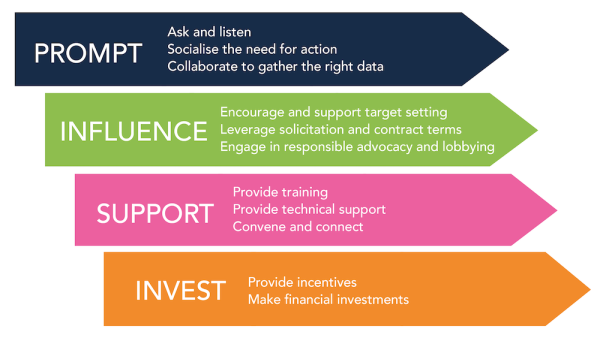Collaborating for Value Chain Decarbonisation
Share this post on:LinkedIn

Image by ABCDstock on Shutterstock.
The call to action is clear: we need decarbonisation of our economy. That means that companies need to take an active role in supporting suppliers and customers to decarbonise.
The complexity of global value chains makes reducing Scope 3 (upstream and downstream value chain) emissions a challenge that requires new and collaborative thinking. From the need to persuade multiple suppliers and customers to collect data and take action to decarbonise, to balancing who pays for the cost of reductions made, simply making demands of your value chain partners is not the answer.
Our conversations with those working at the leading edge of value chain decarbonisation globally have stressed the need to move beyond the traditional procurement approach of placing demands on suppliers enforced through contract conditions. While these can be important levers for action, they can also push the burden onto your value chain partners. Instead of simply mandating action, think about how you can collaborate with value chain partners by offering support and bringing tangible resources to the table.
Collaboration is the only path forward with the speed and energy to support rapid decarbonisation throughout the economy.
Key actions to support your value chain
As you consider your own strategy, think about these four key sets of actions:

PROMPT: At the early stages of engaging your value chain partners on decarbonisation, signal your commitment to collaboration by engaging in two-way dialogue; when required, help partners to understand why action on decarbonisation is urgent; and begin to gather the data that both sides need to take action.
Engagement begins with taking the time to listen and learn. Seek to co-design solutions with value chain partners by listening and creating an open and communicative environment where challenges, needs, and carbon hotspots can be openly discussed. Exchanging knowledge and expertise with your value chain partners can raise understanding, including bolstering carbon literacy and identifying potential solutions.
Try to see your value chain partners as more than emitters – take the perspective that they, like you, are on a journey to decarbonise.
Sharing emissions data between value chain partners is crucial so that each organisation can develop a comprehensive carbon footprint, identify hotspots, and prioritise where to take action. When requesting emissions and related data, especially from SMEs or suppliers in the global south, consider their resource constraints, data accessibility, and capacity limitations. Simplify reporting requirements, provide guidance and resources, focus on key metrics, and be prepared to be flexible and adaptable.
INFLUENCE: You can use your influence to encourage and support value chain partners to set credible emissions reduction targets, reinforce expectations through solicitation and contracting language, and engage in advocacy and lobbying to help create the conditions for your value chain partners to be successful.
When it comes to target setting, instead of mandating, try to take a more collaborative approach to encouraging and supporting your value chain partners to set emissions reduction targets. Suppliers that operate in the global south disproportionately bear the burden of climate change impacts, while they have been the least responsible for creating them1. From a climate justice perspective, it is important to consider these differences regarding the capacity to decarbonise, risks faced, and how to this translates into expectations and obligations. This includes considering the obligations of northern brands and consumers to support (and resource) decarbonisation at the base of the value chain.
Both solicitation and contracting offer excellent opportunities to clarify expectations and influence the behaviour of your suppliers and even your customers. Again, the key is to try to be consultative instead of directive.
A final way to leverage your influence to support your value chain partners to decarbonise is through responsible advocacy and lobbying efforts that support the efficient design and prompt delivery of public policies aligned with a just climate transition. It should be obvious, but this also means ensuring that your company is not lobbying against climate policy and regulation or supporting broader industry associations or business associations that are doing so on your behalf.2,3
SUPPORT: The next level of engagement involves providing training, technical support, and helping to convene and connect communities of practice to support learning.
Consider providing training to help suppliers increase their carbon literacy, set credible targets, gather and report emissions data, and learn about and evaluate the suitability of programs, technology, and opportunities to reduce their carbon footprint. In addition to training, technical support for decarbonisation can be a way to provide more targeted and specialised assistance to enhance the capacity and capabilities of suppliers.
Leverage your network to convene value chain stakeholders, such as suppliers, manufacturers, distributors, and other partners, to engage in discussions, collaboration, and coordinated actions toward reducing carbon emissions. You can even partner with competitors with whom you share suppliers to identify common barriers to decarbonisation and ways to help suppliers overcome them.
INVEST: Companies that are truly collaborating with their value chain are providing incentives and making financial investments to help value chain partners take action to decarbonise.
These companies are willing to pay a premium for products or services or extend preferential financing rates to recognise and support the decarbonisation efforts of suppliers. They are also investing directly in supplier innovation and R&D through accelerator funds and other financial initiatives or collaborating with government, NGO or industry partners. Some are even creating a dedicated fund for sustainable innovation to help suppliers implement improvements and reduce the risk of new technology investment.
Supporting key decarbonisation pathways
Our research also pointed to six key focus areas where companies could be supporting value chain decarbonisation and the work that there are currently undertaking to get there:

Support renewable energy adoption
Build capacity among your suppliers and customers to identify and implement renewable energy opportunities through sharing your knowledge and by supporting training.
Foster collaboration by helping to connect smaller energy users in your value chain into regional networks and by lobbying for regional policies that support renewable energy.
Incentivise and invest in renewable energy through mechanisms such as collaborative power purchase agreements and direct investments in renewable capacity.
Support greater energy efficiency and conservation
Build capacity through funding and connecting suppliers with resources for energy audits and energy management systems.
Collaborate to help suppliers to make emissions saving retrofits and lower the impact of industrial processes.
Incentivise and invest in operations and technology for suppliers to have space, options, and rewards for decarbonisation now and in the near future.
Decarbonise logistics
Build capacity by encouraging a shift towards lower-carbon transport, optimising ordering, delivery, and packaging processes, and promoting energy-efficient practices like eco-driving, effective route planning, and using cleaner fuels and vehicles.
Collaborate for joint planning for optimised routes and schedules, strategically located warehouses and production facilities, and participation in collaborative initiatives focused on green freight programs and alternative fuel networks.
Incentivise and invest through subsidies for energy-efficient transitions, sustainable fuel pricing, infrastructure upgrades with alternative fuel stations, utilising third-party logistics (3PL) for optimisation, and tech investments for improved logistics and planning.
Support better materials stewardship and eliminate waste
Build capacity by performing or funding waste audits, applying industry scorecards, and making use of waste schemes in your sector.
Collaborate at the planning stage to design for less waste, JIT delivery, sustainable materials choices, circularity, and repair.
Invest and incentivise through waste reduction technologies, education, infrastructure for circular systems, and sustainable materials research.
Support lower-impact agriculture and land-use
Build capacity by providing suppliers with education and technical support for regenerative practices and more sustainable land-use.
Collaborate with industry partners; respect Indigenous wisdom, Traditional knowledge, and land rights; and promote knowledge-sharing for a more sustainable and regenerative agricultural model.
Leverage incentives and investments, technical assistance, certification systems, risk management tools, and infrastructure investments to promote sustainable farming and reduce deforestation among suppliers.
Support carbon capture and sequestration
Build capacity among suppliers in carbon capture, sequestration, and nature-based solutions through training and technical assistance and developing clear guidelines and standards for sustainable sourcing, biodiversity conservation, and ecosystem restoration.
Collaborate to drive demand through commitments, collective purchasing, policy advocacy, partnerships, and third-party verification for carbon removal, investment, innovation, and supplier participation.
Incentivise and invest in carbon capture through financing and insurance, acting as early buyers of carbon removal certificates, mitigating risk for carbon-storing ecosystems, and leveraging government incentives for support.
Learn more
To learn more about how your company can collaborate and do its part to support value chain decarbonisation, you can read our full guide Collaborating for Value Chain Decarbonisation. To assemble the guide, we spoke with Chief Procurement Officers (CPOs), category managers, contract managers, and sustainability experts supporting procurement and supply chain teams to understand how leading companies identify leverage points and collaborate to support and accelerate value chain decarbonisation. We also reviewed hundreds of other guides, programs, and case studies to identify resources and examples to help you and your team take action.
Footnotes
1 https://unctad.org/news/unctad-sets-out-actions-support-least-developed-countries-global-low-carbon-transition
2 https://climate-lobbying.com/
3 https://www.ceres.org/resources/reports/responsible-policy-engagement